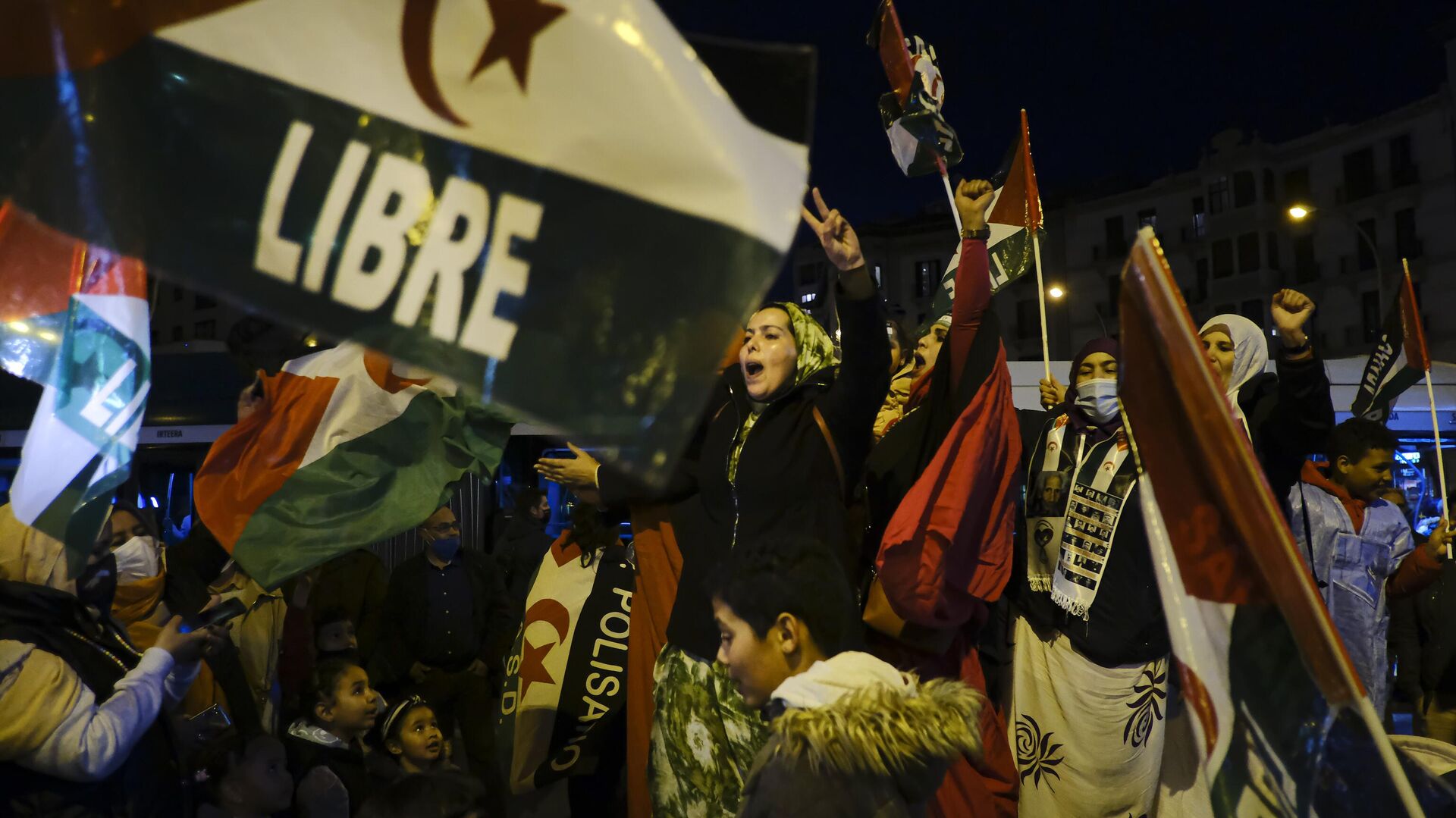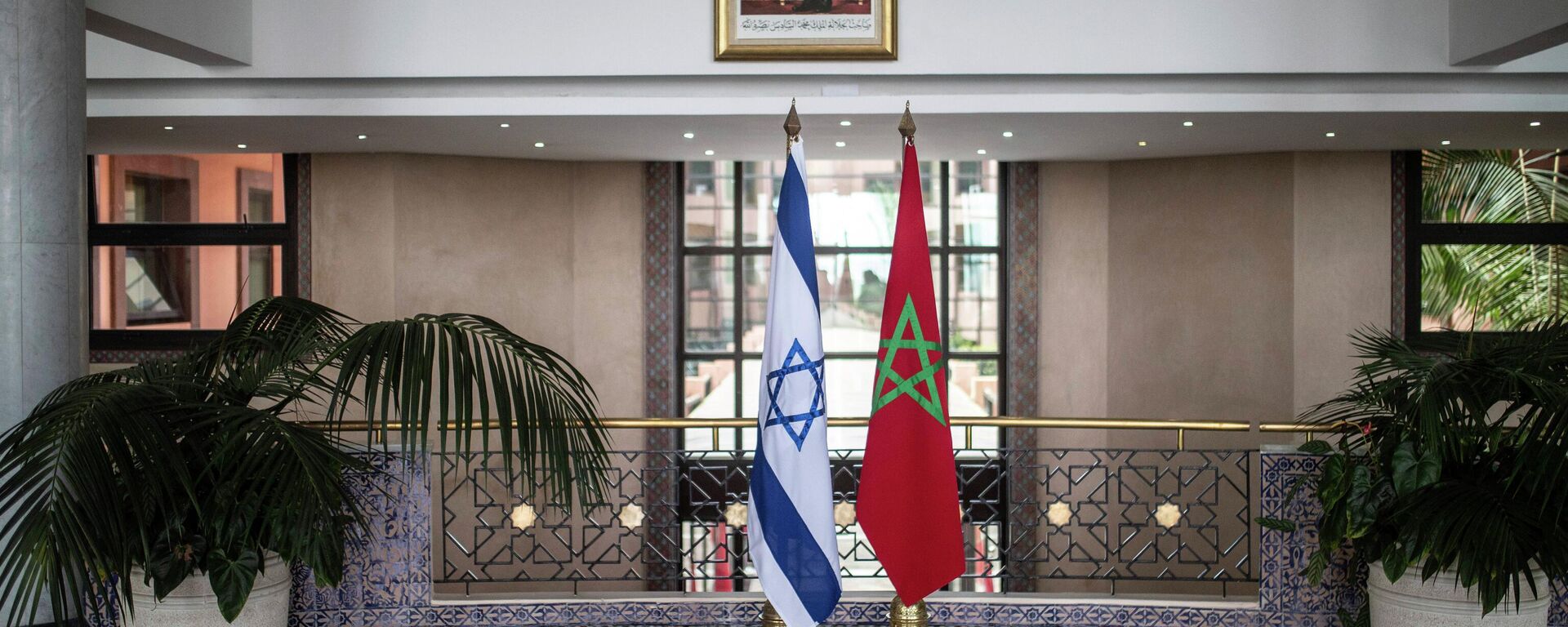https://en.sputniknews.africa/20240408/provocative-western-sahara-reportedly-condemns-frances-plan-to-fund-projects-in-sahrawi-regions-1065964044.html
‘Provocative': Western Sahara Reportedly Condemns France's Plan to Fund Projects in Sahrawi Regions
‘Provocative': Western Sahara Reportedly Condemns France's Plan to Fund Projects in Sahrawi Regions
Sputnik Africa
The Sahrawi Arab Democratic Republic is a partially recognized state that claims most of the territory of the former Spanish colony in Western Sahara, but... 08.04.2024, Sputnik Africa
2024-04-08T16:49+0200
2024-04-08T16:49+0200
2024-04-25T10:22+0200
western sahara
france
north africa
morocco
independence
non-self-governing territories
colonialism
europe
conflict
king mohammed vi
https://cdn1.img.sputniknews.africa/img/07e8/02/14/1065162108_0:160:3076:1890_1920x0_80_0_0_ea1760a38dba30abefc2fd58260190a0.jpg
France's plan to use the French Development Agency (AFD) to finance projects in the disputed Sahrawi territories is a "provocative" move, the media reported last Sunday, citing Western Sahara's Information Ministry.The statement was made following last week's visit to Morocco by Franck Riester, the French minister of foreign trade.According to the French newspaper Le Monde, Riester said that the AFD, through its private sector financing subsidiary Proparco, could assist in the financing of a high-voltage power line project connecting the capital of Western Sahara, Dakhla, and the Moroccan port city of Casablanca.Western Sahara, a former colony of Spain, came under the control of Morocco and Mauritania in 1975. A year later, the Polisario Front, a local nationalist movement, proclaimed the Sahrawi Arab Democratic Republic (SADR) on the territory of Western Sahara.Since then, the Algeria-backed Polisario Front has been fighting the Moroccan government for control of the region. Currently, Morocco controls some 80% of Western Sahara, with 20% being under the control of the Polisario Front.Morocco regards Western Sahara as an inseparable part of the Kingdom and allows only a broad level of self-governance inside its borders. Since June 2007, the two parties have held four rounds of negotiations, all of which have been unfruitful.Moreover, in November 2020, hostilities escalated when Moroccan forces engaged in combat with the Polisario Front forces in the southwest region of Western Sahara after Sahrawi refugees, passing through areas controlled by the SADR, set up a camp, thereby blocking movement in the region that is vital for Morocco to trade with sub-Saharan Africa.Subsequently, the violence expanded along the demarcation line running throughout Western Sahara, that separates territory controlled by the Moroccan Government from territory controlled by the Polisario. Morocco said it acted in self-defense, accusing Polisario of infiltrating the buffer zone and banditry. The Polisario Front, in turn, accused Morocco of breaching the truce by invading the buffer zone and appealed to the United Nations for intervention.The UN, however, does not recognize either Morocco or the Polisario's territorial claims. Thus, Western Sahara has been on the United Nations list of Non-Self-Governing Territories since 1963 following its addition to the list of countries to be decolonized.Currently, the independence of the SADR is recognized by 60 UN member states, with 11 of them have currently “frozen” diplomatic relations with the republic. These states include Algeria, Angola, Iran, as well as a number of African, Asian, and Latin American nations.Some other states, although not recognizing the SADR for various reasons, have expressed explicit support for the right to self-determination of the Sahrawi people. These include the UK, Australia, Russia, Germany, etc.Meanwhile, the US, Israel, China, Egypt and several other countries recognize Moroccan sovereignty over Western Sahara.Reasons for France's 'Controversial' Position on Western SaharaMorocco's relations with France have long been clouded by Paris's ambiguous position on the Western Sahara dispute. The European country hasn't made a clear statement voicing support for Morocco’s sovereignty claims over Western Sahara, but emphasized the necessity of a mutually agreeable political resolution to the territorial dispute. Moreover, the French delegation, which took part in the work of the IV UN Committee on Decolonization in New York in 2022, defended the right to self-determination of the Sahrawi people.Thus, Paris' official position on the ownership over Western Sahara remains unclear, despite calls from King Mohammed VI of Morocco for the kingdom's "partners" whose "positions on the Sahara issue are ambiguous" to "clarify" them.The reason behind this is that France is trying to mend ties with its former colonies Morocco and Algeria, and therefore avoids expressing a clear position on the issue of Western Sahara — a matter that the two North African countries, who have always clashed over territorial claims against each other since independence, do not take lightly.The Élysée Palace's attitude has heightened ongoing diplomatic tensions between France and Morocco, especially given that the dispute over the borders of the Sahara is a legacy of French colonization of Algeria.However, in recent months, France has taken active steps to repair relations with Rabat that have been damaged by Paris' unclear position on Western Sahara and controversial decisions (like last year’s halving of entry visas to Moroccans).
https://en.sputniknews.africa/20230718/israel-recognizes-western-sahara-as-part-of-morocco-1060606281.html
western sahara
france
north africa
morocco
non-self-governing territories
europe
algeria
Sputnik Africa
feedback@sputniknews.com
+74956456601
MIA „Rossiya Segodnya“
2024
Christina Glazkova
https://cdn1.img.sputniknews.africa/img/07e7/0b/07/1063380906_0:0:673:674_100x100_80_0_0_79628b4d0cd9f29291a57aa13bbf9e7a.jpg
Christina Glazkova
https://cdn1.img.sputniknews.africa/img/07e7/0b/07/1063380906_0:0:673:674_100x100_80_0_0_79628b4d0cd9f29291a57aa13bbf9e7a.jpg
News
en_EN
Sputnik Africa
feedback@sputniknews.com
+74956456601
MIA „Rossiya Segodnya“
Sputnik Africa
feedback@sputniknews.com
+74956456601
MIA „Rossiya Segodnya“
Christina Glazkova
https://cdn1.img.sputniknews.africa/img/07e7/0b/07/1063380906_0:0:673:674_100x100_80_0_0_79628b4d0cd9f29291a57aa13bbf9e7a.jpg
western sahara, france, north africa, morocco, independence, non-self-governing territories, colonialism, europe, conflict, king mohammed vi, united nations (un), algeria, history
western sahara, france, north africa, morocco, independence, non-self-governing territories, colonialism, europe, conflict, king mohammed vi, united nations (un), algeria, history
‘Provocative': Western Sahara Reportedly Condemns France's Plan to Fund Projects in Sahrawi Regions
16:49 08.04.2024 (Updated: 10:22 25.04.2024) Christina Glazkova
Writer / Editor
The Sahrawi Arab Democratic Republic is a partially recognized state that claims most of the territory of the former Spanish colony in Western Sahara, but actually controls today only some of its eastern part — the so-called Free Zone. Morocco, however, considers Western Sahara its territory.
France's plan to use the French Development Agency (AFD) to
finance projects in the disputed Sahrawi territories is a "provocative" move, the media reported last Sunday, citing Western Sahara's Information Ministry.
"This is a dangerous escalation of France's hostile stance towards the Sahrawi people," the ministry statement reportedly said, adding that France's plan "represents explicit support for Morocco's illegal occupation of parts of Western Sahara."
The statement was made following last week's visit to Morocco by Franck Riester, the French minister of foreign trade.
"The renewal of French-Moroccan relations will involve new bridges between our private sectors," Riester wrote on X during his visit.
According to the French newspaper
Le Monde, Riester said that the AFD, through its private sector financing subsidiary Proparco, could assist in the financing of a high-voltage
power line project connecting the capital of Western Sahara, Dakhla, and the Moroccan port city of Casablanca.
"The Sahrawi government once again calls on all countries of the world and the public and private sectors to refrain from carrying out any activity of any kind in the Sahrawi national territory," the Western Sahara's Information Ministry was quoted as saying.
Western Sahara, a former colony of Spain, came under the control of Morocco and Mauritania in 1975. A year later, the Polisario Front, a local nationalist movement,
proclaimed the Sahrawi Arab Democratic Republic (SADR) on the territory of Western Sahara.
Since then, the Algeria-backed Polisario Front has been
fighting the Moroccan government for control of the region. Currently, Morocco controls some 80% of Western Sahara, with 20% being under the control of the Polisario Front.
Morocco regards Western Sahara as an inseparable part of the Kingdom and allows only a broad level of self-governance inside its borders. Since June 2007, the two parties have held four rounds of
negotiations, all of which have been unfruitful.
Moreover, in November 2020, hostilities escalated when Moroccan forces engaged in combat with the Polisario Front forces in the southwest region of Western Sahara after Sahrawi refugees, passing through areas controlled by the SADR, set up a camp, thereby blocking movement in the region that is vital for Morocco to trade with sub-Saharan Africa.
Subsequently, the violence expanded along the demarcation line running throughout Western Sahara, that separates territory controlled by the Moroccan Government from territory controlled by the Polisario. Morocco said it acted in self-defense, accusing Polisario of infiltrating the buffer zone and banditry. The Polisario Front, in turn, accused Morocco of breaching the truce by invading the buffer zone and
appealed to the United Nations for intervention.
The UN, however, does not recognize either Morocco or the Polisario's territorial claims. Thus, Western Sahara has been on the United Nations list of Non-Self-Governing Territories since 1963 following its addition to the list of countries to be decolonized.
Currently, the independence of the SADR is recognized by 60 UN member states, with 11 of them have currently “frozen” diplomatic relations with the republic. These states include Algeria, Angola,
Iran, as well as a number of African, Asian, and Latin American nations.
Some other states, although not recognizing the SADR for various reasons, have expressed explicit support for the
right to self-determination of the Sahrawi people. These include the UK, Australia,
Russia, Germany, etc.
Meanwhile, the US,
Israel, China, Egypt and several other countries recognize Moroccan sovereignty over Western Sahara.
Reasons for France's 'Controversial' Position on Western Sahara
Morocco's relations with France have long been clouded by Paris's ambiguous position on the Western Sahara dispute. The European country hasn't made a clear statement voicing support for Morocco’s sovereignty claims over Western Sahara, but emphasized the necessity of a mutually agreeable political resolution to the territorial dispute. Moreover, the French delegation, which took part in the work of the IV UN Committee on Decolonization in New York in 2022, defended the right to self-determination of the Sahrawi people.
Thus, Paris' official position on the ownership over Western Sahara remains unclear, despite calls from King Mohammed VI of Morocco for the kingdom's "partners" whose "positions on the Sahara issue are ambiguous" to "clarify" them.
The reason behind this is that France is trying to mend
ties with its former colonies Morocco and Algeria, and therefore avoids expressing a clear position on the issue of Western Sahara — a matter that the
two North African countries, who have always clashed over territorial claims against each other since independence, do not take lightly.
The Élysée Palace's attitude has heightened ongoing diplomatic tensions between France and Morocco, especially given that the dispute over the borders of the Sahara is a legacy of French colonization of
Algeria.
However, in recent months, France has taken active steps to repair relations with Rabat that have been damaged by Paris' unclear position on Western Sahara and controversial decisions (like last year’s halving of entry visas to Moroccans).



